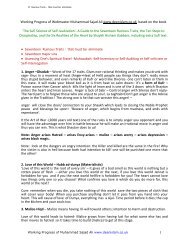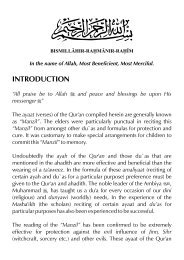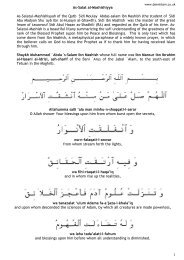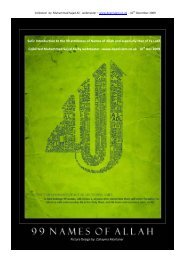Sufi Introduction to the 99 Names of Allah and sufi ... - Deen islam
Sufi Introduction to the 99 Names of Allah and sufi ... - Deen islam
Sufi Introduction to the 99 Names of Allah and sufi ... - Deen islam
Create successful ePaper yourself
Turn your PDF publications into a flip-book with our unique Google optimized e-Paper software.
So stagnation in Dhikr or lack <strong>of</strong> Dhikr causes spiritual death <strong>of</strong> <strong>the</strong> heart <strong>and</strong> which effect our<br />
molecular structure or infected with diseases causing physical <strong>and</strong> spiritual sicknesses, <strong>and</strong> only<br />
with Dhikr it causes movement <strong>and</strong> spiritual growth. To get out <strong>of</strong> this spiritual stagnation one<br />
needs quality Ibadah- worship for <strong>the</strong> soul <strong>and</strong> body which gives movement <strong>and</strong> nourishment <strong>and</strong><br />
positive thoughts- Khawatir <strong>and</strong> duas also changes ones energy levels <strong>to</strong>o.<br />
Every day 70,000 Khawatir (thoughts) pass through <strong>the</strong> heart<br />
Every day 70,000 Khawatir (thoughts) pass through <strong>the</strong> heart <strong>and</strong> none <strong>of</strong> <strong>the</strong>m can escape it <strong>and</strong><br />
<strong>the</strong> whole combination <strong>of</strong> <strong>the</strong>se thoughts is divided up in<strong>to</strong> four categories, referring <strong>to</strong> <strong>the</strong> veiled<br />
hearts: How many <strong>of</strong> <strong>the</strong>se thoughts we grasp depends upon our spiritual awareness. The four<br />
categories are ei<strong>the</strong>r Satanic thoughts (Shaytani), Tarnished Soul thoughts (Nafsani) Angelic<br />
thoughts (Maliki) Lordly thoughts (Rabbani)The Saints say that human beings breaths 24,000<br />
times in 24 hours. That is 12,000 we inhale <strong>and</strong> 12,000 we exhale ( <strong>and</strong> with every inhalation<br />
<strong>the</strong>re are 10 angels accompanying that breath, <strong>and</strong> 10 with every exhalation) <strong>and</strong> our 70,000<br />
thoughts are carried on <strong>the</strong>se breaths.<br />
As our breath leaves our body it makes a signature, a pattern, a colour which is a language, this is<br />
<strong>the</strong> language <strong>of</strong> our thoughts-Khawatir, <strong>the</strong>y are flying in <strong>the</strong> air <strong>and</strong> this language can be read<br />
by Saints <strong>and</strong> this is how <strong>the</strong> saints reads a person‘s heart as all your thoughts leave you mind <strong>and</strong><br />
travel through your breath, which turns in<strong>to</strong> a colour, ei<strong>the</strong>r a negative-darkness or positive-Nur<br />
colour that carries your message (one needs <strong>to</strong> simple think in front <strong>of</strong> a saint-Wali <strong>and</strong> <strong>the</strong>y can<br />
read it from your breath thus, one suddenly get a underst<strong>and</strong>ing or sense <strong>of</strong> <strong>the</strong> tradition as<br />
mentioned earlier ‘safeguard yourselves or beware from <strong>the</strong> mu’min-believer's firasa- insight’<br />
so <strong>the</strong>y are read our deeds, Just <strong>to</strong> mention a little more about firasa- It is well known that Abu<br />
Bakr As-Siddiq is considered <strong>to</strong> be <strong>the</strong> one with <strong>the</strong> greatest firasa in <strong>the</strong> ummah <strong>and</strong> Umar was <strong>the</strong><br />
second. The incidents that prove Umar’s firasah are numerous, familiar <strong>and</strong> well-known. He never<br />
said with regards <strong>to</strong> anything, “I think this is so,” but it was what he thought. The fact that <strong>the</strong><br />
Quran approved <strong>of</strong> his opinion sin many incidents is sufficient evidence <strong>of</strong> his sharp firasah. One <strong>of</strong><br />
which was his opinion regarding <strong>the</strong> redemption <strong>of</strong> <strong>the</strong> captives from <strong>the</strong> Battle <strong>of</strong> Badr.<br />
Once a man named Sawad Bin Qarib passed by <strong>and</strong> Umar dind’t know him. Umar said, “This is<br />
ei<strong>the</strong>r a soothsayer or he was so in <strong>the</strong> days <strong>of</strong> jahiliyyah.” Upon sitting before Umar, Sawad said,<br />
“O comm<strong>and</strong>er <strong>of</strong> <strong>the</strong> faithful! You never received any <strong>of</strong> your guests <strong>the</strong> way you did me.” Umar<br />
said, “What we used <strong>to</strong> do in <strong>the</strong> days <strong>of</strong> jahiliyyah is worse than this. But tell me about what I<br />
have asked you.” Sawad said, “You were true, O comm<strong>and</strong>er <strong>of</strong> <strong>the</strong> faithful! I was a soothsayer in<br />
<strong>the</strong> days <strong>of</strong> jahiliyyah, <strong>the</strong>n he <strong>to</strong>ld him <strong>the</strong> s<strong>to</strong>ry.”<br />
17







